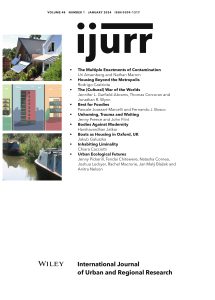Volume 48 Issue 1 January 2024
In This Issue...
On behalf of the IJURR Editorial Collective, it is my pleasure to introduce the January issue of Volume 48, comprised of eight articles and one (refreshingly hopeful) Interventions piece. This issue offers deep insights into processes of urban change, with pieces suggesting alternative vocabularies and new ways of understanding the socio-spatial transformations underway in global capitals, ordinary cities, and localities ‘beyond-the-metropolis’. These articles provide critical reflections on the severest ecological, cultural and political consequences of these changes, as well as on the local response and forms of resistance they elicit. Drawing on research conducted in South America, Europe, the US, South Asia and the Middle East, they examine the local transformations brought about by toxic contamination (military sites in the Tel Aviv region), resource extraction (Amazonia), place marketing and the production of foodscapes (Los Angeles, Paris and Buenos Aires), urban redevelopment (the US and India), and ecological and economic disasters (India, the UK and Italy). While each article entails rich analyses of their particular cases, and thus deserves to be read on its own, a distinct set of ideas comes to the fore when these pieces are brought together in this issue.
The first few articles consider the nature of socio-spatial transformations associated with capitalist urbanization, offering something of an alternative lexicon for discussing the changes they engender. Employing a conceptual vocabulary drawn more from science and technology studies (STS) and the natural sciences, than from the economistic or developmental language more common in urban studies, these pieces help us see these transformations in new ways. Detailing processes of contamination, enactment, terraforming, extraction, extension and embodiment, these pieces illuminate some of the severest but often overlooked political, cultural and ecological dimensions of these changes.
The next set of articles address the displacements, including the forms of ‘unhoming’ and dwelling, produced by disaster-induced transformations such as those associated with building code violations, affordable housing shortfalls, and anthropogenic climate change. These pieces help us see that disasters and the immediacy of responses they engender can make residential spaces uninhabitable or inaccessible. Typically enacted post-disaster (such as London’s 2017 Grenfell Tower fire) to address or prevent future disasters, responses such as new policies, regulations and building codes can produce further ‘unhoming’ when residents are excluded from or overly managed in the planning processes. They also reveal a range of responses to displacement, including resident pacification through waiting, noncompliance and other strategies to ‘fly beneath the radar’, or direct action in the case of Roman squatters. Meanwhile, the London and Rome pieces helpfully reveal the forms of ‘temporal manipulation’ (imposed waiting and appropriated liminality) both facilitating and contesting displacement.
Lastly, this issue’s insightful Interventions piece centers our attention on the urban manifestations of global climate change and suggests alternatives to the neoliberal forms of ‘green’ urban development, such as carbon accounting and techno-economic solutions, that extend corporate control over cities and thus further entrench socio-spatial inequality. Proposing alternative, more collective and resident-centric strategies of urban ecological response, this Intervention demonstrates that such disastrous consequences of urban change are not inevitable and that another urban future may indeed be possible.
— Liza Weinstein
Articles
THE MULTIPLE ENACTMENTS OF CONTAMINATION: Rethinking the Remediation and Redevelopment of Military-Industrial Brownfields in the Tel Aviv Region
Published online on Jan 10th, 2024 | DOI: https://doi.org/10.1111/1468-2427.13220 (p 7-30)
HOUSING BEYOND THE METROPOLIS: Inhabiting Extractivism and Extensions in Urban Amazonia
Published online on Jan 30th, 2024 | DOI: https://doi.org/10.1111/1468-2427.13222 (p 32-52)
THE (CULTURAL) WAR OF THE WORLDS: Framing Urban Redevelopment as ‘Terraforming’
Published online on Nov 15th, 2023 | DOI: https://doi.org/10.1111/1468-2427.13216 (p 53-73)
‘BEST FOR FOODIES’: Food, Digital Media and Planetary Gentrification
Published online on Oct 17th, 2023 | DOI: /10.1111/1468-2427.13212 (p 74-93)
UNHOMING, TRAUMA AND WAITING: The Post-Grenfell Building Safety Crisis in England
Published online on Oct 3rd, 2023 | DOI: 10.1111/1468-2427.13213 (p 94-110)
BODIES AGAINST MODERNITY: Politics of Slum Rehabilitations in India
Published online on Nov 16th, 2023 | DOI: https://doi.org/10.1111/1468-2427.13215 (p 111-125)
BOATS AS HOUSING IN OXFORD, UK: Trajectories of Informality in a High-Income Context
Published online on Jan 30th, 2024 | DOI: https://doi.org/10.1111/1468-2427.13221 (p 126-144)
INHABITING LIMINALITY: The Temporal, Spatial and Experiential Assemblage of Emancipatory Practices in the Lives of Housing Squatters in Rome, Italy
Published online on Jan 30th, 2024 | DOI: https://doi.org/10.1111/1468-2427.13225 (p 145-160)
Interventions
URBAN ECOLOGICAL FUTURES: Five Eco-Community Strategies for more Sustainable and Equitable Cities
Published online on Sep 29th, 2023 | DOI: 10.1111/1468-2427.13209 (p 1610176)

